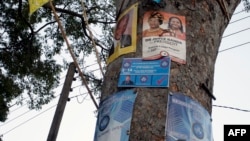BLANTYRE —
As Malawi readies for elections on May 20, media watchdogs have been monitoring Malawi journalists in the election campaign period. One of them is the Institute for War and Peace Reporting or IWPR. It is conducting a monitoring project that so far has released two reports showing a distinct media bias. But media organizations have disputed the findings.
The media monitoring is funded by the U.S. Agency for International Development and the British Department for International Development.
Media outlets under scrutiny in Malawi include the country’s only two daily newspapers, state-owned and privately owned radio and TV stations, online publications and postings on social media like Twitter and Facebook.
“The whole essence is to help the media and tell them that there are certain things they need to do to ensure that their coverage is fair. We are looking at all political candidates that are in the race because it’s a tri-party election,” said Cheu Mita, project manager at IWPR in Malawi.
In its latest report, the organization said the media has been biased, giving more coverage to ruling People’s Party presidential candidate Joyce Banda than the other 11 presidential candidates.
“For example, MBC Radio and MBC TV is pro-PP and cover PP more with a positive tone. Times TV would also cover PP, but with a negative tone. And then you look at Joy radio, we found that Joy is pro-UDF [opposition United Democratic Front] and anti-PP, and that is a fact,” stated Edrinnie Kayambazinthu, a lecturer at the University of Malawi and presenter of the findings.
Brian Ligomeka, the managing editor at the Times Group which owns a number of newspapers and Times TV, told VOA the findings are misleading.
“Their findings are completely wrong and questionable. We at Times Group we have been objective," he insisted, " and what we report are facts and I am surprised that they are saying that we report negatively about the ruling People’s Party (PP).
"What is their definition of negative news? What is their definition of positive news? When they report that Khumbo Kachale [vice president] has resigned from PP, is that negative news?" he asked, "First of all they should give us a clear definition of negative news before making such misleading reports."
Ligomeka also has trashed the report’s findings showing that media outlets have been giving more coverage to the presidential race than to the races of parliamentarians and councilors.
“If the councilors and parliamentary candidates are silent and are not campaigning and are not doing things that are not newsworthy, do you want us to create news for them? We are covering most presidential candidates because they are the ones busy campaigning. So we will not create news for the councilors just for the sake of it. We are not in the business of creativity. We are in the business of reporting facts,” he said.
Mita said the organization is expected to release another report soon after the elections.
The media monitoring is funded by the U.S. Agency for International Development and the British Department for International Development.
Media outlets under scrutiny in Malawi include the country’s only two daily newspapers, state-owned and privately owned radio and TV stations, online publications and postings on social media like Twitter and Facebook.
“The whole essence is to help the media and tell them that there are certain things they need to do to ensure that their coverage is fair. We are looking at all political candidates that are in the race because it’s a tri-party election,” said Cheu Mita, project manager at IWPR in Malawi.
In its latest report, the organization said the media has been biased, giving more coverage to ruling People’s Party presidential candidate Joyce Banda than the other 11 presidential candidates.
“For example, MBC Radio and MBC TV is pro-PP and cover PP more with a positive tone. Times TV would also cover PP, but with a negative tone. And then you look at Joy radio, we found that Joy is pro-UDF [opposition United Democratic Front] and anti-PP, and that is a fact,” stated Edrinnie Kayambazinthu, a lecturer at the University of Malawi and presenter of the findings.
Brian Ligomeka, the managing editor at the Times Group which owns a number of newspapers and Times TV, told VOA the findings are misleading.
“Their findings are completely wrong and questionable. We at Times Group we have been objective," he insisted, " and what we report are facts and I am surprised that they are saying that we report negatively about the ruling People’s Party (PP).
"What is their definition of negative news? What is their definition of positive news? When they report that Khumbo Kachale [vice president] has resigned from PP, is that negative news?" he asked, "First of all they should give us a clear definition of negative news before making such misleading reports."
Ligomeka also has trashed the report’s findings showing that media outlets have been giving more coverage to the presidential race than to the races of parliamentarians and councilors.
“If the councilors and parliamentary candidates are silent and are not campaigning and are not doing things that are not newsworthy, do you want us to create news for them? We are covering most presidential candidates because they are the ones busy campaigning. So we will not create news for the councilors just for the sake of it. We are not in the business of creativity. We are in the business of reporting facts,” he said.
Mita said the organization is expected to release another report soon after the elections.




